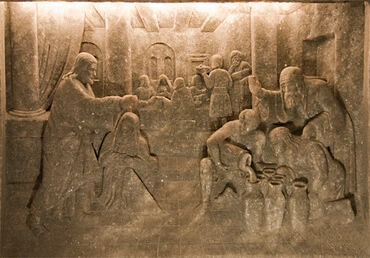4
ויאמר אליה ישוע מה לי ולך אשה עתי עדין לא באה׃
4
ויאמר אליה ישוע מה לי ולך אשה עתי עדין לא באה׃
原作者: Brian David

This is a strange-sounding verse, as Jesus seems to address his own mother roughly and a bit dismissively. It also sounds like he is brushing off the lack of wine as someone else's problem. Both impressions are apparently misleading, though, even in the literal meaning of the story. Mary must not have been put off; she immediately instructed the servants to do whatever Jesus told them to. And rather than shrugging at the lack of wine, Jesus immediately set about performing his first miracle.
Whatever the case, the spiritual meaning offers something much deeper.
The wedding in Cana represents a good, receptive church among the Gentiles. The lack of wine means that the church lacks a true understanding of spiritual things. Jesus represents the Lord's divine goodness, and his mother – representing the Lord's true church on earth – has noted the lack.
But the identity of the Lord's true church is changing; the Lord was born as Jesus to bring an end to the Jewish church in that role and launch the Christian church. "Woman" simply represents a church; when Jesus calls her that it indicates that in a spiritual sense He has no mother church. He is there to start a new mother church.
"Hour" represents a spiritual state, and to "come" means a joining of spiritual states. So when Jesus says "mine hour is not yet come," it means that His spiritual state has not yet been introduced to the church among the Gentiles.
Altogether, then, this verse represents a transition point. The Lord has been using the Jewish church for some 2,000 years to preserve spiritual meanings, even though the people in the church didn't know it and weren't particularly spiritual. But the time has come for change. The new church has not yet begun – it has no wine – but the Jewish church has lost its place – it is no longer "mother," but simply "woman."
©2024 New Christian Bible Study Corporation. All rights reserved. Printed from newchristianbiblestudy.org